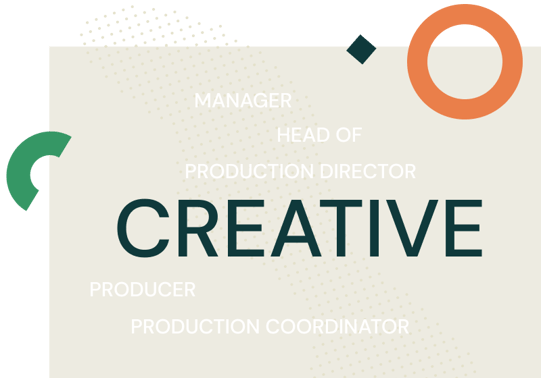Identifying Waste and Workarounds to Improve Your Process
Let's cover a few techniques that can help you evaluate your own process, and hopefully help you...
Welcome to the exciting world of creative production! Whether you're a person just starting out or an experienced professional, creative production is a rewarding field that offers endless opportunities to create and innovate. From planning out stunning videos and digital campaigns to designing intricate print materials and websites, creative professionals play a vital role in helping people communicate their message and reach their target audience.
No matter if you're interested in working with a creative agency or leading an in-house team, there are endless opportunities to make an impact and shape the future.
Let's get started!
In its simplest definition, creative production is everything that brings a creative concept or idea to fruition. At its most complex, one could include everything from developing a marketing strategy and creating marketing materials to producing promotions and delivering a plethora of other related forms of content.
That being said, the production processes for creative projects can vary widely depending on the specific goals and needs of the client. It may involve a number of different steps, such as research and planning, concept development and promotions, design and execution, and testing and refinement.
Creative production requires a wide range of skills, generally including creative problem-solving, design, writing, and production management. It's important for creative professionals to be able to work well as part of a team and to be able to adapt to any changing needs.
And with the similarities in names, creative production and creative operations are often times mistakenly swapped.

Yes, creative production and creative operations are two distinct areas of focus within the creative industry. While they may overlap in some ways, they have distinct characteristics and goals. Read our in-depth piece on what creative operations is, here.
Creative operations refer to the overall management and organization of the creative teams and processes. This may also include things like project management, resource allocation, quality control, and process improvement. Creative production on the other hand refers to the process of bringing a creative concept or idea to fruition. This involves a wide range of activities, from research and planning to design and execution.
Think of creative operations as the how-to create and creative production as the act of creating.
Creativity is an obvious and essential element of both. In creative operations, it is focused on finding ways to improve and optimize the overall creative process, while in creative production, it's focused on the development and execution of specific projects.
Remember, the creative industry is constantly evolving and the roles of creative production and creative operations are likely to change and adapt over time. However, the distinction between these two areas remains an important one, and understanding the difference can help creative professionals navigate the ever-changing landscape of the creative industry.

Creative agencies and in-house teams both play important roles in the creation of marketing materials, advertising campaigns, and other forms of content. However, there are some key differences between the two approaches.
In-house teams refer to the process of creating marketing, digital advertising campaigns, and other forms of content within an organization. This may involve working with an in-house team of designers, writers, and videographers, or it may involve outsourcing certain tasks to freelancers. In-house creative production can be more cost-effective, as they do not need to pay for external services. However, in-house teams may not have the same level of specialization and expertise as external creative production agencies.
External teams refer to the process of creating content using an external creative agency or other partners. External creative production agencies are typically staffed by professionals with varied backgrounds and they may be able to offer a higher level of specialization and expertise than in-house teams. External production can also be more expensive than in-house production, as organizations need to pay for the services of the external agency.
Flexibility and scalability are important considerations when deciding which way to go. Creative agencies are typically able to adapt their processes to the changing needs of their employer and quickly scale up or down as needed. In-house creative production teams, on the other hand, may be more limited in their ability to adapt to changing circumstances and may have more difficulty scaling up or down as needed.
Costs are a significant factor to consider when comparing agencies and in-house teams. Agencies often charge fees for their services, which can be a significant expense. In-house creative production teams, on the other hand, may be more cost-effective in the long run.
Ultimately, the decision between using an agency or an in-house team will depend on the specific project and goals of an organization. Both approaches have their own unique strengths and drawbacks. As with most things, it's important to carefully consider the pros and cons of each option before making a decision.

The following positions are a few of the professional titles you'll find throughout creative production. All of them are responsible in some way for overseeing and managing the production efforts of an organization. Don't forget that the creative production umbrella is huge and can include titles across writing, video, design, project management, strategy, and any other positions that help complete the ask.
Here's a list of creative production positions in no particular order:

The industry is constantly evolving but by following these 10 simple guidelines, and evolving with the industry, your business can hopefully weather most storms.
Plan ahead: Proper planning can make the process much smoother and more efficient. By anticipating potential challenges and developing contingency plans, you can avoid last-minute crises and keep your company on track.
Set clear goals and objectives: It's important to have a clear understanding of what you want to produce. This will help you stay focused and make better decisions about how to allocate resources and time.
Collaborate and communicate: Let's be honest, collaboration and communication are critical to the success of most creative projects. By working closely with your team and stakeholders, you can ensure that everyone is on the same page (or video) and that everyone's needs are being met.
Embrace technology: This goes back to continuously evolving. There is a wide range of tools and technologies available (or coming soon) to support the creative production process. By using these effectively, you can streamline your workflows and increase your productivity. Don't be afraid to try new things.
Be flexible and adaptable: At the employee level and the company level. It's important to be able to adapt to changing circumstances. By being flexible and open to new ideas, you can stay ahead of the curve and ensure that your efforts take you in the right direction.
Foster a culture of what-ifs: Innovation is critical to the success of any creative production. Sometimes the biggest investment you can make isn't with money, it's with time and contact with your team asking (or getting them to ask) what if we did x, y, z?
Hire the right people: Speaking of your team. The quality of your output is heavily dependent on the people and leadership you have on your team. By hiring talented and skilled professionals, you can increase your chances of success. Period.
Manage your budget effectively: By managing your costs effectively, you can ensure that you have the resources you need to develop exactly what you need to lead a successful team.
Process improvement: Does this mean video? Web programs? Design? Project management capabilities? Yes.
This is an ongoing process and it's important to continually look for ways to improve and optimize the process. This may lean a little more into creative operations, but nonetheless, it's important to keep an eye on it in any creative endeavor.
Industry trends and best practices: Staying up-to-date on trends and best practices is important for any creative production professional. This may involve keeping track of new technologies, techniques, and approaches, and incorporating these into your work as appropriate. Keep an eye out for events to take part in.

Creative production is a complex and multifaceted field that requires a wide range of different skills and expertise. From developing marketing strategies to creating marketing materials and advertising campaigns, creative professionals play a vital role in helping organizations communicate their message and reach their target audience. Whether working with clients as part of an agency or leading an in-house team, these professionals must be able to create high-quality content that meets the needs of their clients and helps to achieve the desired goals.
Looking at the future of creative production, it feels like things are only going to speed up. More clients, looking for more content, faster than ever before. If you haven't already, start finding ways to do just that, it's time. This is the year of automation, video, and quicker workflows. Faster, high-quality creative production is needed now more than ever. How will you make it happen?
***
Thank you for reading and we'd love to hear your thoughts on creative production. Feel free to reach out on LinkedIn!
Let's cover a few techniques that can help you evaluate your own process, and hopefully help you...
Want to get notified when we have fresh, new content ready for you?
Become a member of our community - it's free and you can unsubscribe anytime you want.
By signing up, you agree to receive emails from Creative Force and Creative Operations.